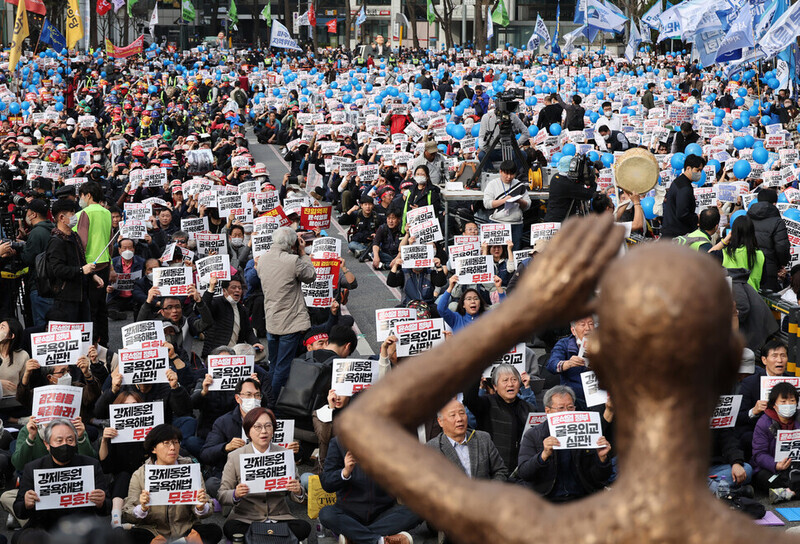hankyoreh
Links to other country sites 다른 나라 사이트 링크
[Column] Calling for the resignation of a certain “senior administration official”


When I look back on the past four years of friction between South Korea and Japan — brought to a close recently with a unilateral surrender by the Yoon Suk-yeol administration — I am left wrestling with a lot of complex thoughts.
In July 2021, I published a book titled “New Cold War: The Battle Between Korea and Japan,” which looked back on the two sides’ conflict during the Moon Jae-in administration — what could be described as the “first half” of this four-year feud. In it, I offered my analysis that the battle was not just a historical dispute: it was a huge clash of worldviews concerning the future of the Korean Peninsula and East Asia.
One strategy was the Moon administration’s aim of changing the status quo by overcoming the Cold War order in East Asia through a resolution to the North Korean nuclear issue and improvements to inter-Korean relations. The other was Japan’s aim of preserving the status quo by foiling Seoul’s attempts and deterring North Korea and China through a stronger trilateral alliance with South Korea and the US. These two strategies, I argued, had come into collision in explosive ways.
While the two sides’ feud was reaching a fever pitch, a debate was held in August 2019 at the Kyungnam University Institute for Far Eastern Studies. I can still remember the remarks made there by Kim Min-seok, a current Democratic Party member of the National Assembly who was then out of office.
“The nation’s destiny and honor hang on this issue, and the destiny of the administration hangs on whether it can resolve this issue effectively,” he said.
Hearing his remarks at the time, I thought he might have been going overboard a bit. Now I can only belatedly recognize how clearly he saw the heart of the matter.
This fierce battle ended with a defeat for South Korea (the breakdown of the North Korea-US summit in Hanoi in late February 2019), and the Moon administration came to an end. The approach of the Yoon administration since then — to utterly repudiate its predecessors’ legacy and go all in on beefing up trilateral cooperation with the US and Japan — may seem brutal, but it’s also a natural consequence.
Still, I did not let go of some feeble hopes for the fledgling Yoon administration.
In my view, the world has already entered a new Cold War era, and the reality of the North Korean nuclear threat means we cannot simply reject trilateral cooperation out of hand. But I held out hopes that the two sides could reach some rational compromise on the biggest issue between them: the compensation of victims of forced labor mobilization during the occupation.
The conclusion that was reached, however, amounted to a complete surrender that achieved neither of the things the plaintiffs were demanding: an apology from Japan and its participation in compensation.
Why did it have to end like this? As I read through a March 6 briefing by a senior Yoon administration official (whose identity I cannot reveal but should be obvious to anyone in the know), I concluded that any analysis would be futile.
“We have no reason to reject a decision by the Supreme Court,” they said, “but in view of international law and the pledges made by the South Korean and Japanese governments in 1965, Japan concluded that the 2018 Supreme Court judgment was a case of ‘South Korea violating its agreement.’”
I’ve seen a lot of press conferences by officials with many foreign governments, including Japan’s. But I had never seen one of them publicly defending the other side’s position while disparaging a ruling by their own highest court.
Why do wars erupt? Perhaps the most striking insights in that regard were those I read in the book “Nevertheless, Japan Chose War” by University of Tokyo professor Yoko Kato. Kato defines war there as “attacking constitutions as the most basic principles legitimizing the authority of the other country.”
What enable the Republic of Korea to exist as it does now are two premises reflected in our Constitution. Ours is a democratic republic that “uphold[s] the cause of the Provisional Republic of Korea Government born of the March First Independence Movement of 1919 and the democratic ideals of the April Nineteenth Uprising of 1960 against injustice.”
That is the gist of the May 2012 Supreme Court (reversal and remand) decision that this government official derided while defending Tokyo’s position, as well as the October 2018 en banc Supreme Court ruling that followed.
Previous rulings in Japan that sided against the plaintiffs were based on the premise that Japan’s colonial occupation of Korea was lawful, so they can’t be viewed as an example of opposing South Korea’s own constitutional values or being “contrary to good morals.”
And the plaintiffs’ demands for compensation were not resolved by the 1965 claims settlement agreement because they were “premised upon the Japanese corporation’s unlawful acts against humanity with direct links to the Japanese Government’s unlawful colonial domination of the Korean Peninsula and waging of wars of aggression,” as the Supreme Court wrote in its judgment in 2018.
A state needs to fight to uphold such values. Sometimes, compromise is necessary, but there are things government officials should and shouldn’t say. What country anywhere in the world is going to respect South Korea when its own government officials disgrace themselves?
This same senior official has caused controversy numerous times in the past. It’s time for them to step down and go back to being a university professor who enjoys “academic freedoms and freedom of thought.”
Please direct questions or comments to [english@hani.co.kr]

Editorial・opinion
![[Column] The state is back — but is it in business? [Column] The state is back — but is it in business?](https://flexible.img.hani.co.kr/flexible/normal/500/300/imgdb/original/2024/0506/8217149564092725.jpg) [Column] The state is back — but is it in business?
[Column] The state is back — but is it in business?![[Column] Life on our Trisolaris [Column] Life on our Trisolaris](https://flexible.img.hani.co.kr/flexible/normal/500/300/imgdb/original/2024/0505/4817148682278544.jpg) [Column] Life on our Trisolaris
[Column] Life on our Trisolaris- [Editorial] Penalties for airing allegations against Korea’s first lady endanger free press
- [Editorial] Yoon must halt procurement of SM-3 interceptor missiles
- [Guest essay] Maybe Korea’s rapid population decline is an opportunity, not a crisis
- [Column] Can Yoon steer diplomacy with Russia, China back on track?
- [Column] Season 2 of special prosecutor probe may be coming to Korea soon
- [Column] Park Geun-hye déjà vu in Yoon Suk-yeol
- [Editorial] New weight of N. Korea’s nuclear threats makes dialogue all the more urgent
- [Guest essay] The real reason Korea’s new right wants to dub Rhee a founding father
Most viewed articles
- 1Amid US-China clash, Korea must remember its failures in the 19th century, advises scholar
- 2[Column] Why Korea’s hard right is fated to lose
- 3[Column] The state is back — but is it in business?
- 4Trump’s talk of flouting NATO promises sparks apprehension in Seoul
- 560% of young Koreans see no need to have kids after marriage
- 6New sex-ed guidelines forbid teaching about homosexuality
- 7Presidential office warns of veto in response to opposition passing special counsel probe act
- 8[Column] Can Yoon steer diplomacy with Russia, China back on track?
- 9[Guest essay] Maybe Korea’s rapid population decline is an opportunity, not a crisis
- 10[Reporter’s notebook] In Min’s world, she’s the artist — and NewJeans is her art